
Lexicon of Love
My relationship with words: It’s complicated.
I’ve lived with words for so long, lived with them intimately, really worked to deepen what we have. I’ve exploited them, sure, but we have an understanding. Words get it, get me, get what all of this is about, regardless of what they say.
“Complicated” isn’t quite what I mean. “Complex” is more to the point. Some words have an immediate impact; sometimes they’re bling. I prefer words that let a feeling to sink in. The words with tarnish and texture appeal to me more than the ones that outright shine.
They’re the ones just beyond the scope of regular use. Neither vague nor technical, they have the heft of specificity that’s usually just right. They’re words that make readers nod with recognition if they’re paying attention. For example, I prefer “partner” to “husband.” While “husband” may have the gloss of privilege, “partner” speaks to the work of building a life together, which often is as business-as-usual boring as any job. There’s a whole story there, full of potential, if you really consider the word.
But if I’d written this post at a different moment, it’s just as likely I would say that words mean not very much to me, that, quite often, they don’t accurately represent the feelings and ideas that inspire them, that they’re surprisingly crude tools for communicating ideas, feelings, concepts, possibilities that are complex–yeah, that’s the word I mean.
When I taught a beginning fiction writing class, I asked the students to introduce themselves by explaining what they liked to write. One young woman blurted, “Erotica,” as if that one word said everything she wanted her writing to be. She explained that she had received some discouragement, and I assured her that my class would be a place she could develop without censorship. I admit that I dreaded my words as soon as I spoke them. I worried that she would write about things I wouldn’t understand and/or that classmates would find offensive and expect me to go back on my word. I began imagining a semester full of awkward conversations.
The conversations were awkward all right. Her “erotica” was full of boring scenes in beds with occasional “erotic” terminology thrown in, e.g., “They fucked.” Whereas I worried she would write technical details that would make us uncomfortable, she settled for the vague extreme. She created an exceedingly dull world littered with bling-words but burdened by moments so cryptically described it seemed she intended them to be private. What she and her readers needed was some specificity to describe what was being communicated, and how the characters felt about what they were communicating.
I struggled to find ways to encourage her to go further without seeming like I was a pervert. She bristled and lumped me in with previous, prudish instructors who attempted to shut her down because they/we didn’t get her “vision.” How could we have possibly understood? She wanted us to know, apparently, but felt reluctant to make herself vulnerable. I think I understand now. She used words that allowed readers to watch from a distance, which doesn’t encourage readers to stick around to find out what’s really going on. Maybe by now she’s found more specific words that slowly (but not too slowly) sink in, making readers want to know more and step closer to begin to understand the complexities.
James Black is a founding member of Book Writing World. He earned a masters degree in comparative literature at the University of Missouri at Columbia. His work has been published in the anthology The New Queer Aesthetic on Television and in the journal Anon. He’s writing his first novel about the family of a closeted, gay soldier stationed in Iraq. Check out his blog, Quota. He contributes to the BWW weekly!

Great, James! Jeez, what if she had become more specific in class. Oy, I’m glad I wasn’t in your shoes that semester.